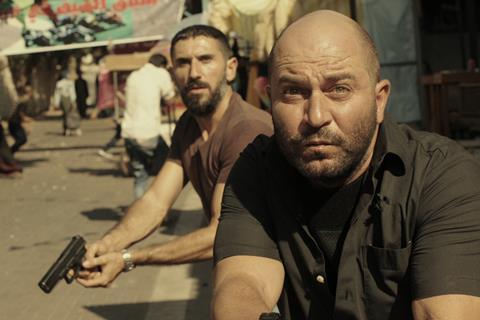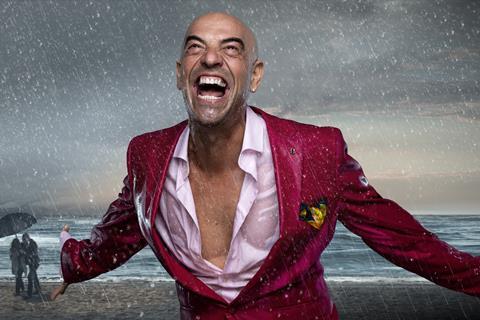The Israel-Hamas conflict has had a profound impact on the Israeli TV and film industry — disrupting production, changing the kinds of projects being made and causing concern over international demand for Israeli shows.

‘For the first couple of months, we did nothing. We were paralysed. We were in shock. We couldn’t think about TV, about Fauda, about anything else,” says Liat Benasuly, producer of the hit Israeli thriller series, reflecting on the Hamas-led attack in Israel on October 7, which sparked the war that continues to rage in Gaza.
All production in Israel came to a standstill following October 7. For several weeks, major networks put all non-factual programming on hold and Israel’s most-watched commercial TV channel, Keshet 12, switched to a 24-hour news cycle. Israel Defense Forces’ (IDF) Home Front Command mandated all local Israeli film and TV productions had to cease.
The country’s film and audiovisual industry jumped into action, with many producers, talent and crew members rushing to join the country’s army reserves and fight on the front lines or aid in relief efforts.
The lines between reality and fiction became blurred as several actors from Gaza-set thriller Fauda answered the call for reserve duty. They included Tzachi Halevi, Yaakov Zada Daniel and Idan Amedi, who was severely injured in a massive explosion in Gaza in January that killed several IDF soldiers.
The show’s co-creators Lior Raz and Avi Issacharoff joined volunteers for NGO Brothers in Arms to help extract families in need from war-impacted regions in Israel.
From mid-October, a few productions shooting in and around Tel Aviv were able to manoeuvre around IDF protocols that capped the number of people who could gather indoors or outdoors and mandated that all cast and crew had to be within one minute of a bomb shelter in case of alert.
Cameras began rolling again in November in central parts of the country, even with missiles firing overhead. The first show to shoot was the third season of Dismissed, a hit dramatic comedy series set in the IDF’s military training for girls that airs on Kan 11 and streams on Netflix in Israel.
Production never truly ceased for some Israeli shows shooting abroad. “We haven’t stopped working,” says Eitan Mansuri, producer of Samuel Maoz’s Foxtrot and series No Man’s Land, who was shooting upcoming series Unconditional for Keshet 12 in the country of Georgia at the time. After taking a few days off to regroup and process what had happened back home, the producers of the family drama opted to continue filming.
They offered all cast and crew the possibility to fly home to Israel or bring loved ones to Georgia, whose borders remained opened to flights to and from Israel, unlike other countries at the time. “In a strange way, it helped people to dive into work and distract their minds from what was going on,” says Mansuri.
The show also shot in India and in Israel where, Mansuri admits, production was “very complicated” as all filming must take place near local “safe zones” where production crews can relocate in the event of alarms or violence in the region. “Productions are complicated to begin with. Israeli productions are even more complicated because they are done on shoestring budgets. Add a war to that and it becomes even more crippling,” he explains, adding: “It feels like everything is going back to normal, while everything is not normal.”
The right balance

Local networks are easing back into more habitual broadcasting schedules, balancing news coverage and more escapist shows. Four months into the war, Keshet 12 launched what was the first new drama series to air on its channel since October, The Best Worst Thing starring Shtisel’s Ayelet Zurer.
“We decided to go for it because we recognised a need for original drama within our content mix,” says Karni Ziv, head of comedy and drama at Keshet Broadcasting. “It’s a romantic drama that deals with a complex subject — a doctor and a patient dealing with cancer, while a love story develops between them — but also provides comfort and escapism.”
The eight-part series featuring a starry local cast premiered on February 19 on Keshet 12; Keshet International will launch sales at MipTV. The show boasted a 25.6% market share, making it the most-watched drama on the network since 2021.
Pay-TV broadcaster HOT resumed production in February with the third season of hit comedy series The New Black from Dori Media. HOT aired the first four episodes of its border police drama series Borders (Mishmar Hagvul), produced by MoviePlus, in late September, then delayed broadcasting the next four episodes for three weeks in the aftermath of the October 7 attacks. It launched dark comedy Tito And Rojo, produced by Yoav Gross, in early February after delaying the release.
Meanwhile, when the war began, production was in full swing on Unité 8200, a Franco-Israeli espionage tale set between Paris and Tel Aviv starring Patrick Bruel and produced by France’s Elephant International and Keshet International. The series was meant to shoot in Paris from August to November, before moving to Israel. But, says Elephant International’s CEO Sandra Ouaiss, “the decision to continue filming in Israel was complicated both in terms of security concerns and moral reasons.”
In the end, producers opted to shoot two days of exteriors in Israel and five days of interiors in Athens. The story does not deal with the current geopolitical conflict in the Middle East and instead probes dangerous technology affecting global politics, so the script, adapted from a bestselling Israeli novel by Dov Alfon, remained untouched.
While “this conflict has generated deep divisions,” says Ouaiss, she adds that “as artists, we have a responsibility to promote living and working together.”
The cast is a blend of French and Israeli talent and directed by Israel’s Dan Sachar, who navigated the different locations and languages, as the show shot in English, French and Hebrew. “Our Israeli head set designer’s assistant is Israeli-Arab. Our lead Israeli actor Tzachi Halevi is married to a Muslim Arab. These are the values we want to defend.” The series is set to air on TF1 later in 2024 and sold by Newen Connect.
Shifting the narrative
A number of shows went back to the drawing board in the wake of the conflict. “Many shows that were in development, including one of mine, were halted or terminated because they became irrelevant,” says Yuval Yefet, Fauda screenwriter and co-creator alongside Rotem Shamir of Netflix’s Rough Diamonds. “When reality changes, it also changes fiction. Our lives have changed, and so will the stories we’ll tell.”
Keshet 12 is shooting a comedy series from local actor Hanoch Daum, with changes and adaptations to the script amid the ongoing conflict. Keshet Broadcasting’s Ziv says: “In all our series that are going to be shot in the coming year, there will be references and adjustments following what happened on October 7, in light of the fact that the Israeli creators were affected and are still affected by this disaster. Even if some of the series we will shoot won’t deal with the issue directly, the disaster resonates in most of them.”
Content coming out of Israel looks to be a blend of escapist fare and also series about October 7, the war or its aftermath based on true events. Keshet 12 has a drama series in the works from Dror Mishani and Moish Goldberg about the terrorist attack on a police station in Sderot; it is also developing series that are completely escapist. “We think that amid all the pain and difficulty, the Israeli audience will also want to watch such content,” says Ziv.
Even with productions able to resume, Berlin-based Israeli producer Danna Stern tells Screen International: “There are some series that have been completed but currently cannot air, and some are ready to start filming but are being rewritten to be more relevant within the current context. Broadcasters are assessing their current and future slates, trying to figure out if projects still make sense. We are going through a seismic event. We are still in this — we are still in a state of war.”
Several shows in various stages of development have been postponed, including completed shows such as buddy comedy Bros originally scheduled to air on Netflix in early November. The feelgood dramatic comedy has had its official release date pushed by several months. Stern, who is part of the show’s production team, said that conversations with Netflix centred around “finding the right time when everyone would be ready to celebrate a new show”.
In a country at war, marketing and promoting programmes, even those with escapist themes, still feels challenging for many broadcasters. Stern, who is a member of Series Mania’s International Panorama jury this year, notes: “The question for the local industry right now is what does an Israeli audience want, first and foremost? Then, zooming out, what does the world expect from us?”
While some shows have had to be rewritten or scrapped altogether, other stories are even more timely in the current geopolitical climate. Yefet and Shamir are developing a new show for Keshet 12 called Four Mothers, set in the late 1990s and based on the true story of the titular Israeli women’s movement that ended the Lebanon War; it is based on the memoir by Four Mothers founder Rachel Ben-Dor.
“Before October 7, we had to explain why it’s a relevant story 25 years later,” says Yefet. “But now, with the war in Gaza and the danger of another war in Lebanon, the world of the show has become our reality to a certain extent. We are starting to tell stories that wouldn’t have been told before October 7.”
Fauda is prepping its upcoming fifth season. The show, which is produced by Liat Benasuly Productions and Yes Studios and plays on Yes TV in Israel and on Netflix internationally, was greenlit in September and pre-production and writing began before October 7. But, explains the show’s producer Benasuly, “We threw it all away and started over again because it felt completely irrelevant after what had happened.” While the show will not fictionalise the events of October 7, it will be set in its aftermath as the characters adapt to the new reality.
In the meantime, in such uncertain times, writers are continuously “writing and rewriting and throwing out scripts,” explains Benasuly, adding: “Every script that I know of has been affected by the war. We can’t ignore what happened and, quite frankly, we don’t want to. It’s such a gamechanger. We want to tell the story somehow. We’re looking for ways to do that.”
How to proceed is difficult. “We don’t want to trigger people,” says Benasuly. “Audiences [at home] are looking for escapism. Networks are airing drama, comedy, romance — nothing complicated.”
However, Fauda’s team are hoping time will bring the opportunity to tell stories more anchored in reality. “A year or two from now, when the show airs, people will want to understand.” She adds that producers also have international audiences in mind and shows like Fauda with global reach are “a way to show the world different perspectives of what happened. We know the picture the world is seeing of Israel, but we don’t want to just show how Israel is great — we want to show it in all its complexities.”
Benasuly is working on another show called Homesick (Taglit) about a group of young Jewish Americans visiting Israel, whose script has been adapted to reflect current events.
International demand
For many in the Israeli industry, a key question is how the war will affect international demand for Israeli productions. At Berlin’s recent European Film Market, producers and film sales agents who spoke with Screen said it was still too early to tell. Some were worried that festivals might be reluctant to select Israeli productions in the future or that international sales agents and buyers might be more cautious about working on Israeli projects — for political reasons or fear of causing a rift with viewers who hold strong opinions on the conflict in Gaza.
This comes at a time when Israeli television has become increasingly dependent on foreign support, whether via co-productions for bigger-budget projects, or pre-sales or remake rights to international broadcasters. “Israeli broadcasters have gone from 100% self-funding scripted fare to 50% and in some cases offering just 30% of the budget, resulting in producers having to look for pre-sales, co-productions and distribution advances to fill in the gap,” says Stern.

Several Israeli shows with international partners are ready to hit the market, but are waiting for the appropriate time since many depict the Arab-Israeli conflict or war-centred themes that may be triggering for audiences.
“Since October 7, there is a sense the international market is taking a step back and that producers and broadcasters may be hesitant to invest in Israeli shows,” notes Stern. “I think many of them want to wait and see how the current situation plays out. At least in the short term, this will result in less funding available for local productions in Israel and a delay in the production of shows that are dependent on bigger budgets.”
The hesitation among international co-producers, broadcasters and financiers comes as budgets are tightened across the international streamers and networks. “[This] leaves the Israeli TV industry in a difficult place,” says Yefet. “With time I’m sure we’ll be able to overcome this and re-establish international partnerships.”
Yaël Fogiel, founder of Paris-based producer Les Films du Poisson, suggests “certain distributors and broadcasters are asking more questions, they are less confident in content from Israel in general, but I don’t sense that in France anything has changed. Even with the fear, even with the uncertainty, even since October 7, financing isn’t easy but it’s possible.”
Keshet International, the sales arm of Keshet Broadcasting, is continuing to do business as usual for Israeli shows. It has sold Israeli drama A Body That Works to 92 territories and just announced a second season is in the works. The surrogacy-centred series was Israel’s top-rated drama at home last year and sold to Netflix in territories across Europe, Latin America and the US, as well as non-exclusively in Israel, in addition to deals with AMC, CBC and SBS, with a UK version in development at Keshet UK.
Kelly Wright, managing director of distribution at Keshet International, says: “We’re seeing a growing interest in scalable, fun, escapist entertainment formats — both scripted and unscripted, across the board. A great show is a great show; a hit format is still a desirable ‘get’ for every buyer’s schedule, no matter from where it originates.”
For the first time, no Israeli shows were selected to premiere at Series Mania, a decision that was purely editorial insists general director Laurence Herszberg, who also says the selection committee received less series from Israel this year. The fate of Israeli content around the world, says Mansuri, “has a lot to do with how Israel as a country will act. The international implications on every aspect of our lives are huge, specifically within our industry.
“I hope that good content and good storytelling can be a bridge,” he adds. “The world is not black and white. I believe in the ability of film and television to bring audiences a more complex perspective and help them to understand there is grey in between the extremes. Film and TV can help bring people together and not just spread hate and anger.”






![The Brightest SunScreen[Courtesy HKIFF]](https://d1nslcd7m2225b.cloudfront.net/Pictures/274x183/3/5/0/1448350_thebrightestsunscreencourtesyhkiff_312678.jpg)


















No comments yet